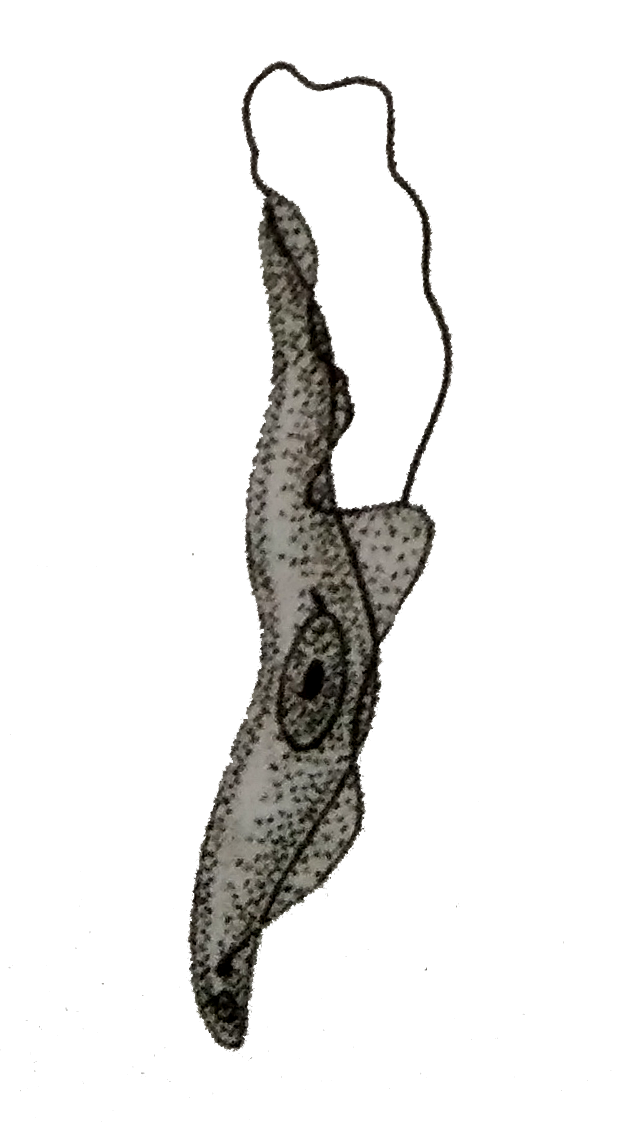Which one is not a protozoan protist
Plasmodium vivax
Paramecium coudatum
Enterobius vermiclaris
Trypanosoma gambiense.
The correct Answer is:C
To determine which of the given options is not a protozoan protist, we will analyze each option step by step.
1. Identify the Options: The options provided are:
- A) Plasmodium vivax
- B) Paramecium caudatum
- C) Enterobius vermicularis
- D) Trypanosoma gambiense
2. Analyze Plasmodium vivax:
- Plasmodium vivax is a unicellular organism that belongs to the kingdom Protista. It is a protozoan parasite responsible for malaria and requires two hosts: humans and female Anopheles mosquitoes.
- Conclusion: This is a protozoan protist.
3. Analyze Paramecium caudatum:
- Paramecium caudatum is a well-known example of a ciliated protozoan. It is unicellular and uses cilia for locomotion.
- Conclusion: This is also a protozoan protist.
4. Analyze Enterobius vermicularis:
- Enterobius vermicularis is commonly known as the pinworm. It is classified as a nematode (roundworm) and belongs to the phylum Helminthes. It is an intestinal parasite and does not belong to the kingdom Protista.
- Conclusion: This is NOT a protozoan protist; it is a nematode.
5. Analyze Trypanosoma gambiense:
- Trypanosoma gambiense is a pathogenic protozoan that causes sleeping sickness. It is a unicellular organism and is classified under the kingdom Protista.
- Conclusion: This is a protozoan protist.
6. Final Conclusion:
- Among the options, Enterobius vermicularis is the only organism that is not a protozoan protist. Therefore, the correct answer is C) Enterobius vermicularis.
- A) Plasmodium vivax
- B) Paramecium caudatum
- C) Enterobius vermicularis
- D) Trypanosoma gambiense
- Plasmodium vivax is a unicellular organism that belongs to the kingdom Protista. It is a protozoan parasite responsible for malaria and requires two hosts: humans and female Anopheles mosquitoes.
- Conclusion: This is a protozoan protist.
- Paramecium caudatum is a well-known example of a ciliated protozoan. It is unicellular and uses cilia for locomotion.
- Conclusion: This is also a protozoan protist.
- Enterobius vermicularis is commonly known as the pinworm. It is classified as a nematode (roundworm) and belongs to the phylum Helminthes. It is an intestinal parasite and does not belong to the kingdom Protista.
- Conclusion: This is NOT a protozoan protist; it is a nematode.
- Trypanosoma gambiense is a pathogenic protozoan that causes sleeping sickness. It is a unicellular organism and is classified under the kingdom Protista.
- Conclusion: This is a protozoan protist.
- Among the options, Enterobius vermicularis is the only organism that is not a protozoan protist. Therefore, the correct answer is C) Enterobius vermicularis.
Topper's Solved these Questions
- KINGDOM PROTISTA (UNICELLULAR EUKARYOTES)BOOK - DINESH PUBLICATION ENGLISHCHAPTER - KINGDOM PROTISTA (UNICELLULAR EUKARYOTES)EXERCISE - CHECK YOUR GRASP
19 Videos
- KINGDOM PROTISTA (UNICELLULAR EUKARYOTES)BOOK - DINESH PUBLICATION ENGLISHCHAPTER - KINGDOM PROTISTA (UNICELLULAR EUKARYOTES)EXERCISE - CHECK YOUR GRASP
19 Videos
- KINGDOM PLANTAE OR METAPHYTA BOOK - DINESH PUBLICATION ENGLISHCHAPTER - KINGDOM PLANTAE OR METAPHYTA EXERCISE - CYG
20 Videos
- LEAFBOOK - DINESH PUBLICATION ENGLISHCHAPTER - LEAFEXERCISE - CYG
10 Videos
Similar Questions
Knowledge Check
Identify the given figure of a protozoan protist and select the correct option.
 Aentamoeba histolyticaBPlasmodium vivaxCGiardia intestinalisDTrypanosoma gambiense
Aentamoeba histolyticaBPlasmodium vivaxCGiardia intestinalisDTrypanosoma gambienseCasaual organisms of sleeping sickness and kala-azar belong to which of thefollowing groups of protozoan protists?
AAmoeboid protozoansBFlagellated protozoansCCiliated protozoansDSporozoansWhich one of the following protists is not correctly linked to the type of movement it shows ?
AAmoeboids-pseudopodiaBCiliates-ciliaCZooflagellates-flagellaDSporozoa-flexing the pellicle
Which is not parasitic protozoan
View SolutionWhich is a ciliate protozoan
View SolutionThe digestion of food in all protozoan protists is .......
View SolutionCompare any four important characteristics in various protozoan protists.
View SolutionWhat type of digestion of food takes place in all protozoan protists ?
View Solution
